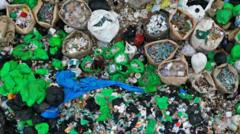In Busan, South Korea, discussions among over 200 countries intended to establish a treaty against plastic pollution ended without consensus. The negotiations, meant to resolve a looming crisis over the worldwide plastic waste issue, highlighted stark divisions. About 95 nations, including the UK and EU, called for stricter controls on plastic production, while oil-rich nations such as Saudi Arabia and Kuwait strongly opposed these measures, fearing economic repercussions.
Despite a global agreement in 2022 recognizing the urgency of tackling plastic pollution, which has seen over nine billion tonnes produced since the 1950s with less than 10% recycled, negotiators could not reach a compromise. Plastic waste significantly impacts marine life, causing injuries and fatalities to birds and sea creatures.
Key talks centered on whether to commit to reducing plastic production or merely increasing recycling efforts. Environmental advocates expressed frustration over the fossil fuel industry's influence on the negotiations, which seemed to prioritize economic interests above environmental health. As ocean plastic waste is projected to triple by 2040, hopes pivot towards a new meeting next year, with some countries considering forming an independent treaty to combat plastic pollution effectively.
Industry leaders like Nestlé call for immediate action but now face delays, with the situation underscoring the challenges in balancing environmental needs with economic growth. As the search for consensus continues, the momentum for plastic reduction remains strong among most nations, highlighting the growing urgency to address this pressing issue.
Despite a global agreement in 2022 recognizing the urgency of tackling plastic pollution, which has seen over nine billion tonnes produced since the 1950s with less than 10% recycled, negotiators could not reach a compromise. Plastic waste significantly impacts marine life, causing injuries and fatalities to birds and sea creatures.
Key talks centered on whether to commit to reducing plastic production or merely increasing recycling efforts. Environmental advocates expressed frustration over the fossil fuel industry's influence on the negotiations, which seemed to prioritize economic interests above environmental health. As ocean plastic waste is projected to triple by 2040, hopes pivot towards a new meeting next year, with some countries considering forming an independent treaty to combat plastic pollution effectively.
Industry leaders like Nestlé call for immediate action but now face delays, with the situation underscoring the challenges in balancing environmental needs with economic growth. As the search for consensus continues, the momentum for plastic reduction remains strong among most nations, highlighting the growing urgency to address this pressing issue.





















